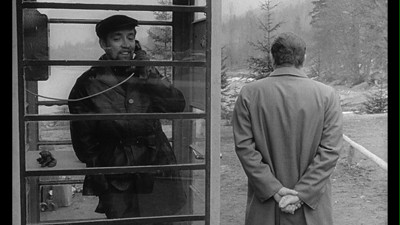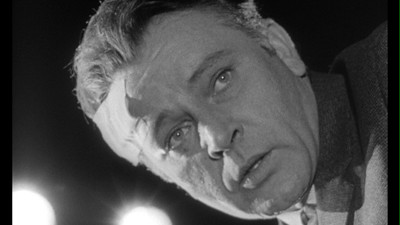
The thing that differentiates a great espionage picture from a bad or even merely good one is the same thing that drives the genre's detractors mad: the degree to which it leaves the viewer in the dark. When watching a spy movie, one should often be scratching one's head, sometimes even while exiting the movie theatre and the movie is over. Criss-crossing lies, duplicitous relationships, and a sense of futility are the spymaster's stock and trade. The Coen Bros. recently made great comedy hay out of the ridiculous obfuscation of these kinds of stories in their film Burn After Reading, keeping their hapless C.I.A. agents guessing as much as the audience--though in that case, the audience knew what the government didn't, that it all looked meaningless because it really was.
In the 1965 adaptation of the John le Carré novel

Alec is a veteran of the Cold War, having been the long-term head of British operations in East Berlin. He's seen it all, the trading of human lives and the dogmatic adherence to rules that forbids lending a helping hand to a defector running across Checkpoint Charlie until he's already reached the safety point. It leads to a man's death and gets Alec pulled back to England. He thinks he's going to be fired, but his boss (Cyril Cusack) has a much more ironic assignment for him. He will pretend to retire instead of taking a desk job, letting his disgruntlement be known, and then pose as a defector himself. Once he has crossed to the other side, he will confess to evidence that the Brits had planted long before, implicating the #1 commie, a former Nazi named Mundt (Peter Van Eyck), as a traitor and giving Fiedler reason to make a move against him.

That is about as clear about the plot as I want to be without giving too much away. That's even more than I knew going in, and the air of confusion and mystery is created rather quickly once Alec begins his undercover work. For the beginning of it, I wasn't quite sure if he had accepted the assignment or not, and until he meets one of le Carré's most popular characters, George Smiley (this time played by Rupert Davies), his true motivations for his prior actions are left unexplained.
As are his true emotions. It's in that meeting with Smiley and their boss, the aptly named Control, that we get the sense that the young radical Alec met at the library he has been working at has actually made an impression on the heavy-drinking spy. The girl, Nan (Claire Bloom), is an idealist who thinks communism can bring peace, and her earnest commitment is laughable to an old cynic like Alec. Even so, the girl is kind to him, and when it looks like the operation to smear Mundt is going to get dangerous and pull him out of England, Alec does his best to protect her. Of course, this will also be his biggest mistake: for a man who sees no meaning in anything else, the fact that Nan now means something to him won't fail to go unnoticed.

The world of The Spy Who Came in from the Cold is a harsh one full of moral tundras that make the distinction between right and wrong seem childish. Even the phrase, which refers to an agent like Alec being brought back to regular life after field service, evokes a landscape that is dangerously chilly. (So much so that the characters in the film are always bundled up, no matter what country they are in.) If there is ever a case to be made for why some movies work best in black-and-white, it's a film like this, where the basic tonal values of the photography can drive home the extreme gulf between the warring points of view, not just in the use of whites and blacks but in all the grays that lay in the middle. Director Martin Ritt (Hud
The true message that Alec must accept, though, is the one he delivers to Nan earlier. After discovering her anti-nuke, power-to-the-people leanings, Alec tells her an espionage parable, based on events he witnessed, where two grey trucks converged on a highway, crushing a family station wagon that was driving down the middle of the road between them. He didn't see the crash himself, he had moved on, never looking back. Though he thinks that the point of the story is that the mighty, interchangeable forces of world government always trample the innocent underfoot as they rush for power, the true message is the one that everyone else is trying to teach him: you can't stay in the middle, one must choose a side. It doesn't have to be either of the grey behemoths or even either side of the Wall they have built to separate their ideologies, it can be taking a stand against both of them in defense of the station wagon. You just have to stand for something. If you don't, you will find yourself caught in the no man's land, confused as to why the men on both sides of the divide have their guns trained on you.

For a full rundown on the special features, read the full article at DVD Talk.

1 comment:
like your take on this classic film. to read mine check the url below.
http://thewholeshebanginanutshell.blogspot.com/search/label/Classic%20Cinema
Post a Comment